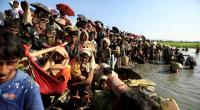 At least 18 more undocumented Bangladeshi nationals were arrested from the Laredo Sector of the US-Mexico border last week, bringing the total number of Bangladeshis apprehended from this sector alone to 274 in this fiscal year, according to Border Patrol officials.
At least 18 more undocumented Bangladeshi nationals were arrested from the Laredo Sector of the US-Mexico border last week, bringing the total number of Bangladeshis apprehended from this sector alone to 274 in this fiscal year, according to Border Patrol officials.
A town along the US-Mexico border in Texas, Laredo continues to account for the maximum number of arrests of Bangladeshis compared to other Border sectors.
The crossings are made through the Rio Grand River in south Laredo.
Last month at least one immigrant died while crossing the river and after medical examination he was identified as a Bangladeshi national.
There’s no particular reason why maximum Bangladeshi nationals try to get into the United States through this crossing. Officials say cartel-connected human smugglers control the routes and they decide who they are going to cross and from where.
“It goes to show that our agents are arresting people from all over the world on a daily basis. Their intentions for entering the country illegally can only be determined after they have been arrested,” said Laredo Sector Assistant Chief Patrol Agent Gabriel Acosta.
Many of those arrested are under distress and are provided medical help before being handed over to immigration officials.
All of them undergo criminal history checks utilising multiple databases including the use of biometrics to ensure those with criminal history are positively identified regardless of their immigration status,
Officials say the immigrants do not try to hide or escape and instead they walk up to the Border agents and claim “credible fear” to their safety in their home country to trigger the asylum process. The international agreement to protect asylum seekers emerged after the World War II when the United Nations signed the refugee convention. It was ratified by the United States and incorporated into law in 1980.
The international agreement to protect asylum seekers emerged after the World War II when the United Nations signed the refugee convention. It was ratified by the United States and incorporated into law in 1980.
The goal is to provide a safe haven for those who can prove they are fleeing persecution in their homeland.
President trump has repeatedly railed against this practice calling it a “mess” and declaring, “We have the worst laws anywhere in the world, we don’t have borders.”
The administration is now toughening its stand on “catch and release”, an unofficial name for a practice where people caught in unlawful immigration status are released while they wait for a hearing with an immigration judge.
The Bangladeshi embassy in Washington DC says they are aware of these arrests and “provide full co-operation to the US government in verifying their identity”.
An official at the embassy recently told Bangla Tribune that most of those arrested, claim political asylum and blame the Bangladeshi government in power but “they have no documents to support their claim”.
The immigration courts have a backlog of hundreds of thousands of cases, and it can take years for a case to work its way to completion. In that time, the individuals build lives in the US, and critics point to the immigration courts' backlog as a major factor in the growing number of foreign nationals trying to cross into the US despite the risks involved.
The US Department of Justice has now announced it will evaluate immigration judges on how many cases they close and how fast they hear cases.
Immigration activists have criticised the move saying it will potentially jeopardise the fairness of courts and may lead to far more deportations.
 National
National
41124 hour(s) 1 minute(s) ago ;
Morning 06:55 ; Thursday ; Jun 26, 2025
At least 18 Bangladeshis arrested in US-Mexico border
Send
Brajesh Upadhyay, Washington
Published : 16:39, Jun 04, 2018 | Updated : 16:39, Jun 04, 2018
Published : 16:39, Jun 04, 2018 | Updated : 16:39, Jun 04, 2018
0 ...0 ...
/pdn/zmi/
Topics: Top Stories
- KOICA donates medical supplies to BSMMU
- 5 more flights to take back British nationals to London
- Covid19: Rajarbagh, Mohammadpur worst affected
- Momen joins UN solidarity song over COVID-19 combat
- Covid-19: OIC to hold special meeting
- WFP begins food distribution in Cox’s Bazar
- WFP begins food distribution in Cox’s Bazar
- 290 return home to Australia
- Third charter flight for US citizens to return home
- Dhaka proposes to postpone D8 Summit
Unauthorized use of news, image, information, etc published by Bangla Tribune is punishable by copyright law. Appropriate legal steps will be taken by the management against any person or body that infringes those laws.
Bangla Tribune is one of the most revered online newspapers in Bangladesh, due to its reputation of neutral coverage and incisive analysis.
F R Tower, 8/C Panthapath, Shukrabad, Dhaka-1207 | Phone: 58151324; 58151326, Fax: 58151329 | Mob: 01730794527, 01730794528


